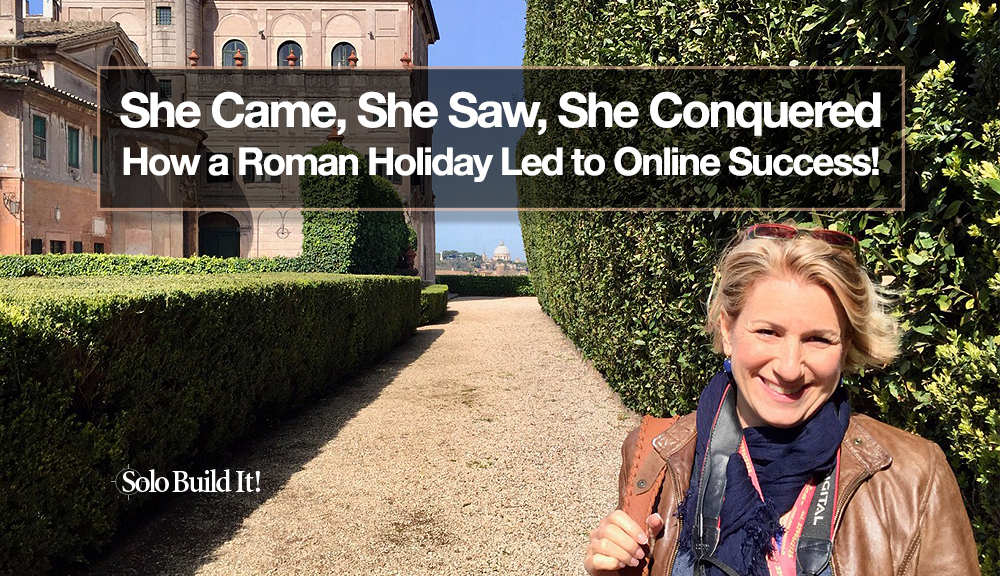
The money part is great, but knowing I made something useful out of nothing, is the best feeling!Elyssa from romewise.com
Originally from Florida, Elyssa moved with her Italian husband to Rome. They started a small B&B. Naturally, their B&B had a website. One day, a friend asked Elyssa, “Why don’t you fill that white space on your website with Google ads?”
Elyssa was horrified. Ads on her hotel site? Never! But her FAQ page about things to do in Rome got a lot of attention from guests and visitors… hmm, could she spin this into something new, independent from her hotel?
Could she create an information rich site about Rome, based solely on her knowledge and passion? Could she create something useful out of nothing? The challenge was on!
How Elyssa managed that challenge, and what she learned from it, she shares with us in the interview below.
1. Elyssa, you have a BA in anthropology and are originally from Florida. Now you run a boutique hotel in Rome. How did this come about?
I think many people find themselves changing careers several times in their lives. In my case, the progression went something like this:
I got my BA in anthropology, which is a fine liberal arts degree but useless in that field unless I went further with my education.
Armed with my degree and two foreign languages under my belt (French and Spanish), I figured the world was my oyster! I wound up in retail management because it was fairly easy to get a job in that area, until I “figured it out.”
Several years down the line I wound up in software development, which is what I was doing when I met my now husband Alessandro, on a fateful trip to Rome in 1997.
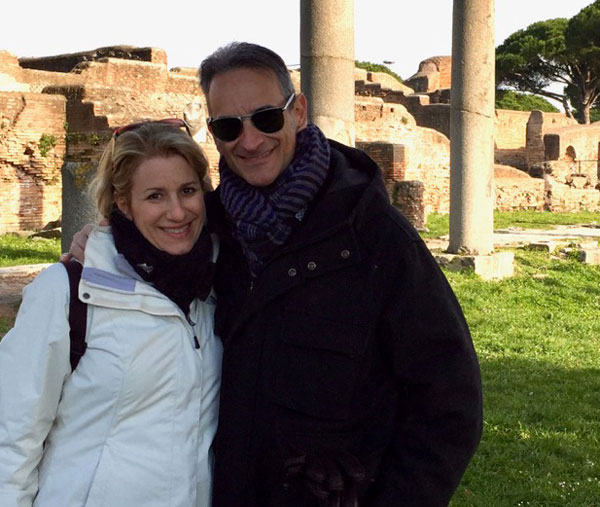
We married and moved here to Rome in 2001. The idea was to open a small Bed and Breakfast, which is something Alessandro said he knew how to do. The world of tech jobs was changing rapidly, and I wanted something new and different. I was ready for a change.
The 3-room B&B we opened in 2001 has become a 10-room boutique B&B/hotel in Rome. We are very proud of all we’ve done to get here but it’s been a lot of hard work!
With her move to Rome, Elyssa prepared the ground for Romewise.com. The “seedling” was still missing though until a friend mentioned online advertising to her…
2. Romewise.com was born because a friend had mentioned online advertising to you. Can you tell us more about that?
Our B&B has a website of course. Somewhere in 2009, a friend from the US who was selling online advertising, said to me, “you have some white space on your B&B’s website. Why don’t you put Google ads there and make some money?”
I was properly horrified at the idea, thinking it would not do to try to “hard sell” our B&B guests or potential guests. (In fact, even to this day we still don’t advertise on our B&B site. Most hotels don’t.)
However, she gave me an idea. Hmmm, the FAQ page which I’d written, seemed to get a lot of feedback from guests and potential guests hungry for help with their stay in Rome. What if I spun that off into its OWN website? I could put Google ads there!
I did a web search for “build a website” and the first result that came up was an SBI! site (at the time). On this site, the owner talked about SBI! and how great it was.
I read it. Put it away, came back to it. Hmm. $299? But, it was going to give me a lot of control, plus a lot of learning and help… maybe it would be worth it. I finally took the plunge, and boy, was that one of the best investments I ever made.
In fact, the “site building” is the easiest part. The hard parts are 1) the research and planning 2) the traffic-building and 3) the monetization (converting your visitors into income).
That’s why SBI! provides not just the tools, but also the process and guidance for building a long-term online business that generates income and equity.
And that’s why people who overcome their initial concerns and keep an open mind (like Elyssa) realize what a bargain SBI! is. Elyssa called SBI! “one of the best investments I ever made.” Fellow SBI! member Arthur Gueli, owner of InjuryClaimCoach.com put it this way:
In all my transactions across the various domains of life, I compare price for value. Nothing, anywhere, even comes close to the value provided by SBI!.
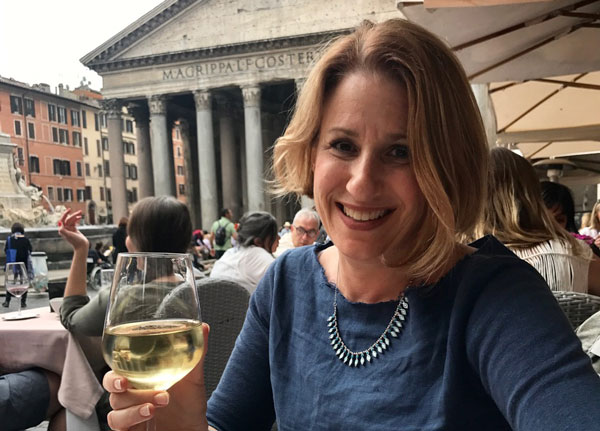
3. Tell us about your philosophy regarding content. How do you know what your prospective customers are looking for? Where does this information come from?
I love the Brainstorm It! tool in SBI!. I like using it, and seeing the numbers. I am curious sometimes at what I think should be a great topic, but which has bad numbers (bad I mean, if you go by the Action Guide, of course.)
But the Action Guide and my helpful fellow SBI! members in the forums also say “keep it real,” and “don’t be profit-number-bound.” Sometimes I simply KNOW I should write a page on a topic because I LIVE with this stuff every day.
One of my very first pages, “Roma Pass” was born because it seemed to me that all our B&B guests wanted to know if this pass was worth it. The demand and supply numbers for this keyword phrase were not great. But I knew people were looking for this information, because they kept asking us.
So I created the page. That’s not a good keyword at all. It’s too broad and has too much competition. But – it became one of my number one pages. And, it’s almost always on the first page of Google results if you search for it. So I guess listening to my intuition was right.
It also helps you to determine the business potential your niche has, or even to come up with possible niches in your area of interest.
But — computers cannot think. They collect and report data with incredible efficiency. But they cannot ask themselves, “Does this make sense for my niche?”
Elyssa followed SBI!’s advice (“don’t become number-bound”) to a tee. While Brainstorm It! helps you identify the best keywords for your niche, you still need to apply your intimate niche knowledge when you make the final calls about which keywords (or topics) to write about.
Another thing I do is engage A LOT with my readers. I answer every comment or question on Facebook, Instagram, via email and on the website itself. In my newsletter I tell readers to tell me what they want to know.
A reader wrote asking me to please write a page about bathrooms in Rome. So I did. Not very sexy I know. But she was thrilled, and told all her friends and — well I’ve even figured out how to monetize on this page!
It’s very satisfying to get emails from people telling me how helpful they find the website because of THIS page!
By doing so, you’ll achieve two things:
1) You get ideas for new in-demand content to create. Even for topics as exotic as “bathrooms in Rome.” 🙂
2) You build up a relationship with your readers and visitors. They get to know you as the trustworthy and likeable person behind all that great content. We call this process “PREselling.” It’s the third step in SBI!’s proven approach to building an online business: Content – Traffic – PREsell – Monetize.
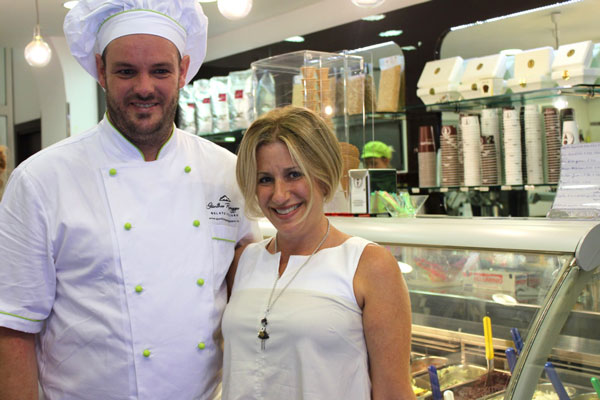
4. How does your offline business (your hotel) benefit from www.romewise.com?
In the beginning, I didn’t connect the two. I wanted to see if I could make a website from scratch, with visitors who came and stayed because of the site itself. Also I was not sure how the site would turn out.
Only in the past year or so I started to link between them. I’d say they both help each other out. That was never actually a main goal, but it is a nice fringe benefit!
Take Melissa Makris for example, whose massage therapy clinic was profitable from day one due to the steady stream of clients she attracted through her SBI! site. Or Richard Bergman, who established himself as an authority in the deck building industry with his SBI! website. This opened the doors for him to sell his own patented products in stores all over the U.S. and Canada.
On the other hand, you are not just “putting up a site” with SBI!. You are building an online business in its own right. So Elyssa’s approach makes total sense. She wanted to see if Romewise.com could become profitable without any “help” from her B&B. And profitable it became. More on that below.
5. Is getting guests for your hotel the only income stream from your online business? If you have other ways of monetizing, what are they and what made you choose them?
As I said, the website was never meant to be a marketing tool for our B&B. It was a challenge for myself, even a curiosity at first.
As time went on, two things happened – the site became more popular, and the hotel business in Rome changed. When I first started working on www.romewise.com, our B&B had more business than we could handle, so it didn’t even occur to me at that time that the website could bring us business. In fact, initially, I had thought that the hotel would bring traffic to the website once it was “good enough.” (More on this below.)
By the time Romewise started to really take off, the hotel business had become much more difficult, and it turned out that maybe Romewise could help our B&B after all. So now I link them to each other, and each helps the other bring targeted traffic.
However, the main goal of Romewise was, as I say, to see if I could do it, and oh, if I could even make a little money too, that would be great. In retrospect, I think I should have taken this part, monetizing, more seriously from the get-go.
Once I had maybe 30 pages, my sister asked me why I didn’t have Google ads on my site. I said well the site isn’t “good enough” yet. She said, you are leaving money on the table. Just put the ads there. Remember what Obama said: “Never let perfection get in the way of the good.”
I put the ads there. They started earning me about $20-30 per month. Now it’s closer to over $400 per month. Bottom line, don’t wait until your site is perfect to start monetizing, or you never will!
She’s not the only one who made this mistake. In fact, most solopreneurs jump into building their website or blog without a clear idea of how to monetize it — even without knowing how profitable their chosen niche is.
That’s precisely why the SBI! Action Guide devotes the first 5 chapters (we call them DAYS) to researching your niche and planning your monetization mix thoroughly, before you write your first page, even before you register your domain.
We recommend to start monetizing after you have around 25 high-quality content pages and a steady stream of about 100 visitors per day. Like many solopreneurs, Elyssa chose Google AdSense as her first monetization model.
Contrary to most other solopreneurs we interviewed, Elyssa’s income from AdSense continued to increase even in recent years, in line with her rising traffic numbers. Adding “matched content” units (only available when you have a certain amount of traffic and ad impressions) helped boost her AdSense income further.
AdSense isn’t Elyssa’s only income stream though. Let’s hear in what other ways she monetizes.
I also use the following companies to monetize, with very mixed results:
1) Viator – Wow. I do not even hard sell tours on the site. I sprinkle links in around some pages, not even all pages. And I sell over $20,000 worth of tours per month through them. So I am earning about $1,000 per month now only with Viator.
2) I recently realized that Viator ONLY displays tours in USD. So I have started to ALSO use GetYourGuide. I can see that having excellent potential moving forward.
The affiliate monetization model can work well for travel sites if you have enough traffic and you do it the right way! What is the right way? Here are some pointers…
- Research the companies before you promote them; choose them only if they offer good quality tours and excellent customer service.
- Weave links to relevant offers naturally into your content
- Add value for your visitors; explain what they will find when they click on your link and how they would benefit.
- Use text links rather than banners.
- Don’t use too many links on one page.
If you are in the travel niche, check out our recommendations for popular travel affiliate programs to join.
In the screenshot below you’ll see how Elyssa weaves text links to Viator and “Get Your Guide” into her content. The first two links (highlighted in yellow) are internal links to other pages on her site. The last two links (“click here”) are the affiliate links.
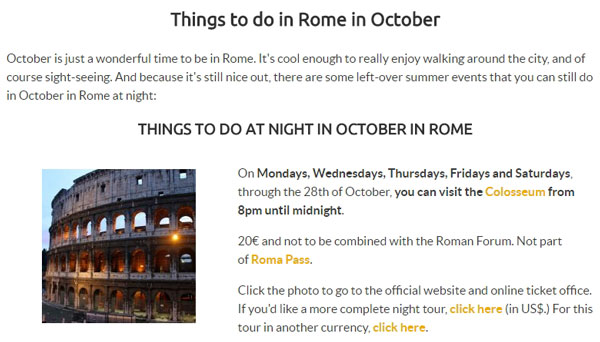
3) Amazon – I have a page for every month in Rome, and suggest what to pack. I also have some suggestions on my main “What to Pack for Rome” page. I am flattered and honored that people really listen to me and my ideas, and buy stuff I suggest. I need to use Amazon more, but for now, it earns around $100 – $150/month.
Again, it’s important to add value for your visitors, not just plaster Amazon links or banners all over your page. See how Elyssa does it in the screenshot below. This is from her “What to Pack for Rome” page. The images on the left are Amazon products and link to the respective sales page there. To the right, she explains why she recommends to pack this item.
Her recommendations sound natural, like a tip you’d give to your friend, not a “sales pitch.” No wonder her visitors trust her recommendations!
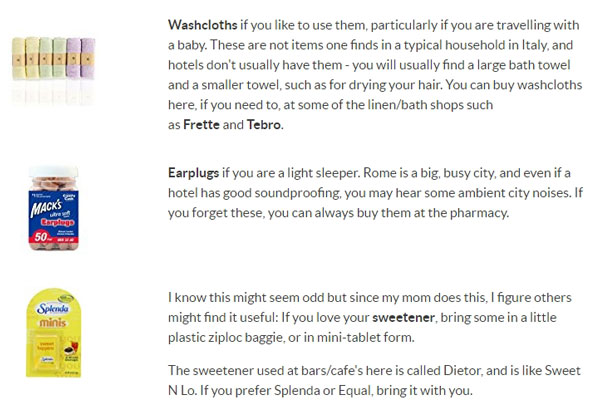
4) Google AdSense – went from nothing to around $400/month as of this writing.
5) I am kicking myself I did not put TicketBar on my site earlier. The minute I put them there (not even optimized yet), I started earning over $200/month. So there is a lot of potential there.
6) Commission Junction – pretty pathetic. I have links but it brings me peanuts. I do need to flesh out my accommodation pages so maybe that will help. Right now it earns maybe $100/month, but I know for others it can earn much more. Something to work on.
7) My next project will be eBooks. I am convinced I will regret not doing this sooner.
8) Finally, I also plan to start using YouTube, and to see how that can help bring traffic, brand awareness and hopefully, advertising income.
Our advice to SBI! members once they have a good amount of traffic? Maximize your $-per-visitor ratio. A good rule of thumb is to earn 1$ per month per visitor. So, if you have 1,000 visitors per day on average, you should at least earn $1,000 per month.
The Action Guide dedicates two full chapters (“DAYS”) to leading you step-by-step through investigating, planning and implementing the monetization models that best fit your niche and personal preferences. The options range from fully passive models like advertising to fully active models like selling your services or products.
It’s great to hear that Elyssa plans to publish eBooks next. For an information based business like hers, eBooks are an excellent way to monetize (selling your eBooks) and grow your subscriber list (giving away a free eBook in exchange for your visitor’s email).
6. You use social media to promote your online business. How did you decide which platform(s) to use? Why do you think they work best for your niche?
I took me awhile to get on the social media boat. I resisted. I knew I had to be there so I signed up for all the platforms I could think of. I drew the line at SnapChat. I spoke to a Rome blogger about this once. She said, “use the social media that YOU will use.” Choose the one you like and post updates regularly.
Facebook works for me because I was already on it on a personal level, so it was relatively easy to learn the business side. I don’t advertise but word of mouth seems to work. I am at 2000+ followers and that number continues to grow.
A lot of my readers are on Facebook. Many of them engage with me there, and I engage back. I also started doing live video, which, for a travel site like mine, seems to resonate with readers quite a lot (which is why I want to get into YouTube and more Instagram videos too).
I also use Instagram. Instagram seems very popular, and I, in turn, am encouraged by my followers who like what I do. I figure it will slowly grow. Many Instagram followers are not on Facebook and vice versa, so I feel it’s important to do both. And with a travel site like mine, photos are very important.
I have to force myself to use Pinterest. It’s ideal for a travel business as it’s a visual platform, and I know it brings traffic. I do like the platform, I just feel I don’t have time for it.
I also use Twitter but it’s morphed into something else, i.e. a place to hang out with Romans and Italian speakers. But somehow, even Twitter brings me traffic little by little.
My feeling is that any social media is just icing on the cake. It’s more about spreading brand awareness, and maybe bringing in just a bit more traffic.
Socializing is the networking part of business, the relationship-building. Having a strong social presence is increasingly important, especially if you have something to sell. It both builds your “Brand of One” and enables you to personally network to powerhouses in your niche.
But… doing social media well is time consuming. That’s why you cannot (and should not) be everywhere. Elyssa’s blogger friend recommended to “use the social media that YOU will use.”
Our advice is different. Yes, it’s helpful to choose a platform that you know and like personally. However, it’s more important that your ideal visitor or customer is using the platform. How do you know on which platform your target audience likes to “hang out”?
You research the various platforms. The more you know your niche, the easier this will be. If you’re unsure, the Action Guide shows you techniques about how to research your target audience online.
For example, visual niches like travel, photography, food or crafts, tend to do well on Pinterest and Instagram. If you are a lawyer, accountant or marketing consultant, you should probably be on LinkedIn. And while Facebook is typically seen as the “must be” network, it may or may not work well for you.
To help SBI! members like Elyssa make the most of their social media presence, “Social Media Action Guides” are coming to SBI! (included in every SBI! subscription for free). There’s too much information about social media marketing on the Web. Our Action Guides take the best, add unique insights from winning marketers and present it in a logical, step-by-step format. All you have to do is follow along!
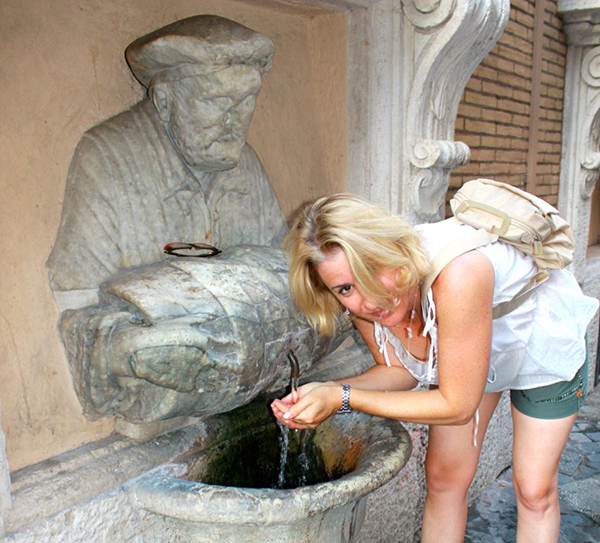
7. What has been your biggest challenge so far as an online and offline business owner?
This is an easy question to answer. My biggest challenge is time management. Whether you run one business or two, it’s crucial to figure out how to…
- budget your time wisely,
- not get caught up in time-wasting stuff, and
- create and really stick to a goal-oriented plan.
It is STILL a challenge to me, to this very day.
You have to be disciplined about how you spend your time, as Elyssa points out. Focus on the tasks that matter most for your business. And that’s exactly what SBI! is designed to help you with.
We cannot provide you with more hours per day (we wish we could!). But we can give you the perfect combination of tools and process, so that you invest every last second into the most meaningful business-building task.
In a recent survey, we asked our customers for the top 3 ways in which SBI! has helped them succeed. In third place, after the Action Guide and the helpful “pay it forward” forums community, was the fact that SBI! provides them with exactly the information they need to know (at any given point in time) and which action to take to move their business forward.
8. What do you enjoy most about being your own boss? How has it changed you, your life, your family?
I like the idea of being in charge of my own schedule. I say “idea,” because it’s not entirely accurate. Even when you run your own business, you do have to keep to a schedule. But it’s ok, because for the most part, I do get to decide what to do and when and how to do it.
But the best part about creating my online business is the sense of accomplishment at making something from scratch. Something that others like and find helpful.
It sounds corny to say but one of the most rewarding things about this project is hearing from readers who tell me how my website was like a bible for their trip planning, or how they found a particular restaurant because of me.
The money part is great, but knowing I made something useful out of nothing, is the best feeling!
It has changed me and my life mostly in the dynamics of how I go through my days. If not for my site, I would not be as glued to my phone, I would not always look at every single thing around me as a possible Instagram shot or Facebook post… or web page topic! In that sense it has made my life a bit more intense, but I still love it.
Luckily, my husband supports and encourages me, and knows when he has to wait to eat something so I can take a picture of it first. 🙂
Why? Because you build your business around something you know and love. You focus on your visitor first. You OVERdeliver. You fulfill your reader’s desire or provide a solution to their problem. You build a business to be proud of, something of value to others and yourself.
When you see everything around you (including your spouse’s lunch dish!) as content for your business, you know that you are “living and breathing it.” Whether you take this as a curse or a blessing, is for you to decide!
9. And finally… What’s your top tip for someone who is just starting a solopreneur career?
My top tip for someone starting a solopreneur career is to face your fears.
- Fear it won’t be good enough (It will. It will be YOURS.)
- Fear of how much work is ahead (You have to start somewhere — then put one foot in front of the other.)
- Fear of the competition (Just don’t.)
- Fear of failure (There are no guarantees in life. But if you don’t try, you definitely won’t succeed.)
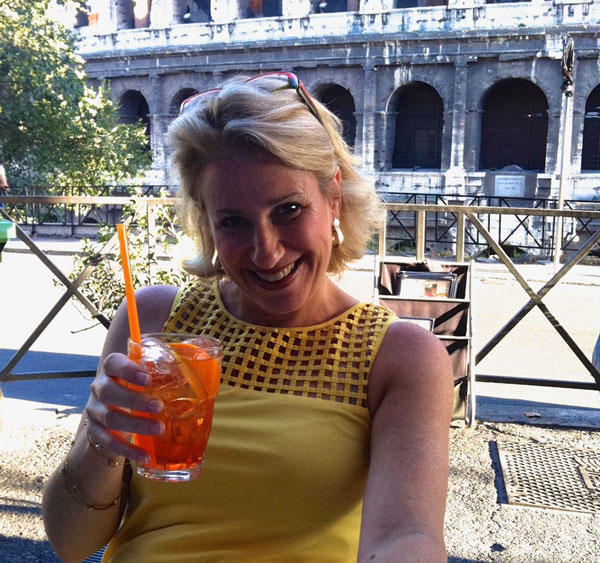
You can do this!
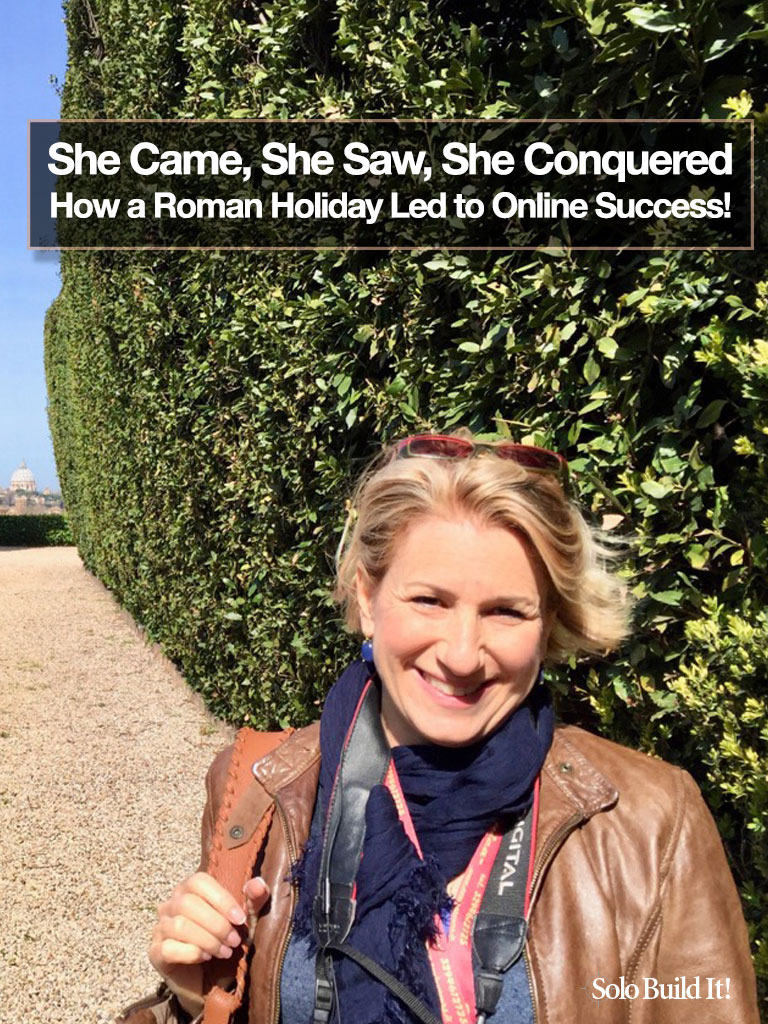
Latest posts by Margit Streifeneder (see all)
- From Traffic Peaks to Auto-Pilot: A Psychologist’s Website Success Story - March 27, 2025
- From Swim Teacher to Solopreneur: Building Passive Income Online - February 27, 2025
- From Concierge to Global Tours: 10 Lessons for Travel Business Growth - December 19, 2024

